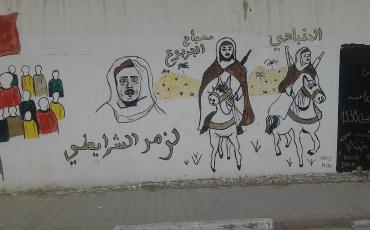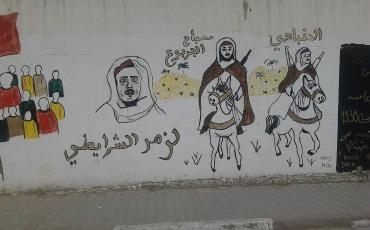Since the end of July 2021, the Tunisian President Kais Saied has been in power by means of an emergency ordinance. In the interview with dis:orient, Ahmed Bedoui from the Tunisian NGO IWatch assesses the political situation in the country.
On July 25, 2021, Tunisian President Kais Saied suspended parliament, lifted the immunity of MPs and dismissed much of the government. President Saied is referring to the constitution of Tunisia, which was drawn up by an elected constituent assembly between 2012 and 2014 after the overthrow of the long-time dictator Zine el-Abidine Ben Ali.
We spoke with Ahmed Bedoui. He is a Legal Counsel at IWatch, the Tunisian branch of Transparency International. There Bedoui is involved in the fight against corruption and political transparency.
President Saied invokes Article 80 of the Tunisian Constitution to dissolve Parliament. This states that the "[i]n the event of imminent danger threatening the nation’s institutions or the security or independence of the country, and hampering the normal functioning of the state, the President of the Republic may take any measures necessitated by the exceptional circumstances.” Saied justified this step, among other things, with the incompetent Corona policy of government members such as Prime Minister Hichem Mechichi." How does IWatch evaluate this approach?
IWATCH has viewed the President's actions with concern and vigilance. The principle of separation of powers is at stake by the decision of the president. IWATCH is of the opinion that the use of Article 80 in this case is not constitutional, as there are no constitutional control bodies, above all no constitutional court, which can monitor the use of the emergency article. Indeed, the president was one of the actors who delayed taking the necessary steps to set up a constitutional court.
As for the dismissal of former Prime Minister Hichem Mechichi, IWatch had repeatedly called for his resignation. Mechichi was unable to get the health, financial and social crisis under control. However, IWatch believes that the rationale given by the President for using the emergency article is ambiguous. IWatch has already written a letter calling on the President to specify his reasons for using Article 80.
Has this letter already been answered?
No.
According to a survey by the radio station MosaiqueFM, 80.49 percent of Tunisians think the president's measures are correct. Even before the president's announcement on July 25, protesters called for the resignation of the government and the dissolution of parliament. What went wrong in the political apparatus?
The situation before the emergency was already very critical. First, the parliament was fragmented. As a result, the election of the constitutional representatives, scheduled for April, could not take place and the constitutional court could not be established as the primary supervisory authority for compliance with the constitution. In addition, several MPs were suspected of corruption and there were also some who were accused of conflicts of interest. In this regard, IWatch has prepared dossiers and taken the necessary steps to prosecute the people.
Second, the judiciary itself suffers from the “virus” of corruption. Recently, however, criminal disciplinary proceedings were finally initiated against the judges Bechir Akermi and Taieb Rached. IWatch has long been committed to enforcing the law against all citizens.
Thirdly, there has been a “cold war” in the executive branch between President Kais Saied and Prime Minister Hichem Mechichi since this year. The trigger for this was that the president did not approve the reshuffle of the cabinet that Mechichi was aiming for. At this point it is necessary to mention the poor performance of the government in general.
One of the reasons why Kais Saied has won the presidential elections in 2019 was the fact that he has run for the elections as an independent candidate with a clear distance to any political party which were considered corrupt by the Tunisian public. He now declared that he wanted to implement his long-announced fight against corruption. IWatch has also been involved in this area since 2011. Is Saied a credible partner for you in the fight against corruption?
We followed the President's speech on July 28, in which he promised decisive action against corruption in politics. However, he has not made any actual efforts in the direction of fighting corruption so far.
That is why, IWatch, as part of its role as a watchdog organization, took the initiative and published a roadmap to fight corruption on the same day. This roadmap contains measures and ideas for an effective fight against corruption. This must be a continuous process free from abuse of power and conflicts of interest.
The day after Kais Saied declared the state of emergency, the office of the Al Jazeera news channel in Tunis was closed by Tunisian security forces. Was that legal? And what does that mean for freedom of expression in Tunisia?
The security forces have made use of decree number 50 of January 26, 1978, which allows them to control the press and all other publications in the event of an emergency. Nonetheless, the decree violates Article 21 of the Constitution, which guarantees Tunisian citizens rights and freedoms. This also includes freedom of expression.
There has been a lot of resentment in the Tunisian media recently about international coverage. What does IWatch think about the current international media discourse about Tunisia?
Unfortunately, we have noticed that international reporting on Tunisia is often not very neutral. International media should remind themselves that Tunisia is a sovereign country accountable only to its citizens.
A central question that arises after the developments of the last few weeks is whether Tunisian democracy can survive this crisis.
Admittedly, the ambiguity of the situation after July 25, 2021 represents a major risk in Tunisia's democratic transformation process. In fact, the application of Article 80 of the Constitution has invalidated the guarantee of the separation of powers and the balance between powers. For this reason, it is important to create clarity about the political situation, which IWatch intended with the aforementioned letter to Kais Saied of July 26.
On the one hand, the application of the emergency article poses a challenge for democratic political structures. On the other hand, there were serious problems such as the economic crisis, youth unemployment and corruption. What can a sustainable and democratic way out of the current situation look like?
We need measures and ideas for an effective fight against corruption that are implemented in a continuous process free from abuse of power and conflicts of interest. This includes, among other things, the dismissal of civil servants involved in corruption cases and regular audits, including for public-sector companies. In addition, the reports of the control authorities have to be made public and their decisions have to be implemented. The enforcement of court judgments in the fight against corruption is also particularly important.





















